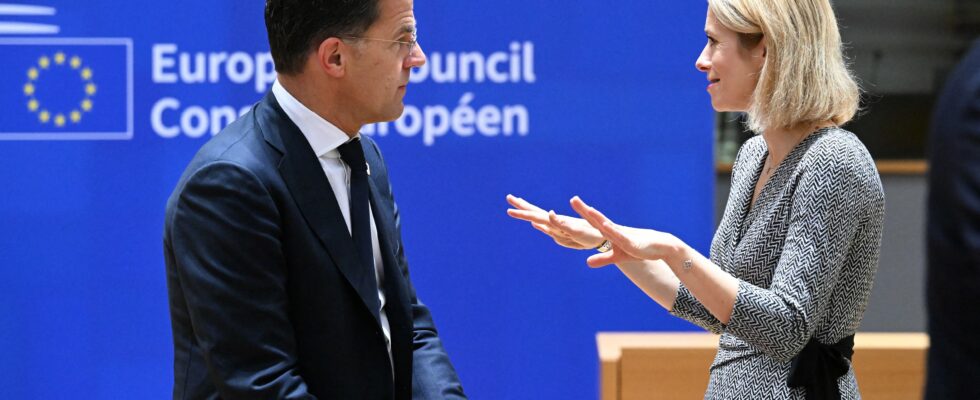While the new European Commission is making its mark, intense geopolitical news requires proactive European diplomacy, capable of strengthening ambitious compromises between member states. In this regard, the nominations ball which is still being played out in Brussels represents a real opportunity to strengthen the bloc’s voice internationally.
The choice of Kaja Kallas, former Prime Minister of Estonia and true “Iron Lady”, to embody European diplomacy as High Representative of the EU, testifies to this dynamic. A hard-liner against Russia from the start, she must respond to numerous challenges. She will work closely with the future European Commissioner for Defense and Space, and former Lithuanian Prime Minister, Andrius Kubilius, a supporter of firm support for Ukraine. These appointments shift the center of gravity of European security issues to Eastern Europe.
The President of the European Commission, Ursula von der Leyen, has been reappointed. Her first mandate was marked by a number of major challenges – Brexit, Covid, the Russian invasion of Ukraine – which she, in part, helped to resolve through her diplomatic activism. As for the presidency of the Council, it goes to Antonio Costa, former Prime Minister of Portugal for almost a decade and a true veteran of political life. Despite a career marked by setbacks, he is known for his skills in negotiation and finding compromise – essential qualities for reaching agreements with the 27 capitals.
On the NATO side, the Dutchman Mark Rutte, a national – unlike the outgoing Secretary General, the Norwegian Jens Stoltenberg – of an EU member state, has always been firm against Moscow since the espionage affairs. in The Hague in 2022 and the crash of flight MH17, where the majority of victims were Dutch. The one who officially took office on October 1 will be a valuable ally of Kallas in strengthening the European pillar of NATO.
This new EU-NATO teaming presents a notable difference with the previous one: all these leaders have known each other for a long time and, above all, appreciate each other. This should make it possible to overcome certain dysfunctions in the European diplomatic machine, which suffered greatly from the tensions between Ursula von der Leyen and Charles Michel, as well as better coordination between the two organizations, thanks to Rutte. This will be an asset in responding to two major challenges.
Preserving the transatlantic relationship in turbulent times
Foreign affairs issues are hardly present in the American election, which gives pride of place to the fight against inflation, societal issues and sovereign issues. If a victory for Democratic candidate Kamala Harris could offer a certain continuity to the transatlantic relationship, the underlying trend is towards strategic withdrawal and the concentration of resources in the Middle East and South-East Asia.
In the event of Donald Trump’s re-election, European decision-makers, and the head of NATO in the first place, will have to redouble their efforts to avoid cascading disaster scenarios, from the abandonment of Ukraine to the restoration of because of the principle of collective defense provided for in Article 5 of the Alliance. Rutte was also, in part, chosen for his relationship of trust with the former president and was even nicknamed “The Trump Whisperer” (the man who whispers in Trump’s ear).
Whatever the result of these elections, Europe must become aware of the limits of the American umbrella, and contribute more strongly to defending its borders. Russia will not – probably – militarily attack EU member states tomorrow, but its victory in Ukraine would show the fragility of European means.
Better coordination of defense budgets
While Russia devotes 4.6% of its GDP to war, Europe struggles to achieve an average of 2.6% for its defense. The gap is abysmal. And the answer cannot wait. But the task promises to be complex, and this objective hampered by German skepticism and political instability and the unprecedented budgetary crisis affecting France.
This new EU-NATO leadership should have the legitimacy to convince European partners to accelerate the continent’s rise to power. Indeed, under the mandate of Kaja Kallas, Estonia increased its defense budget to 2.7% of GDP. Mark Rutte, although considered the leader of the so-called “frugal” countries, increased Dutch spending to 2% of GDP. Antonio Costa also included Portugal in this dynamic.
Better coordination of defense budgets is crucial to maximize the interoperability of forces. The report by the former governor of the European Central Bank (ECB), Mario Draghi points out precisely this weakness and proposes the issuance of defense Eurobonds by the ECB, and encourages mergers between major European players in the arms and of technology.
This new situation offers an unprecedented opportunity to respond to these challenges. As Henry Kissinger points out: “Diplomacy is the art of navigating a complex world, building bridges where walls seem impassable.” It is up to the new European and NATO leadership to be up to the task.
* Hector de Rivoire is a lecturer in economics at the Institute of Political Studies in Paris. Arthur de Liedekerke is director of European affairs at the consultancy Rasmussen Global.
